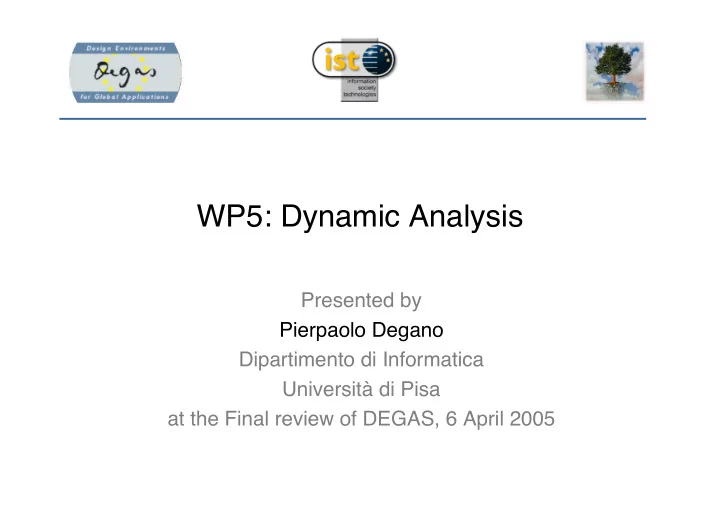

WP5: Dynamic Analysis Presented by Pierpaolo Degano Dipartimento di Informatica Università di Pisa at the Final review of DEGAS, 6 April 2005
Objectives of WP5 • Comparing and finding new language abstractions to design global applications; • New models and techniques for integrated quantitative and security analysis; • Enhancing understanding and applicability of dynamic analysis for global computing systems; • Proof-of-concept implementations to validate the above treatment. Two tasks: stochastic features + security features
Relevance for Global Computing Analysis tools are needed for • Measuring global applications • Comparing protocols while checking them correct • Finding trade-off between security and efficiency • Establishing the timeliness of response and efficient use of resources of global applications during the design phase
The DEGAS view: WP5, WP6 reflection static static analysis analysis security security class extraction features features diagrams UML design model in sequence fully automatic and process diagrams hidden from the user calculus activity stochastic diagrams features Markov model
Deliverables on Dynamic Analysis • D8 Process algebras for Global Applications Report on the basic primitives for the abstract design of global applications • D10 Models and techniques for dynamic analysis Report on the foundational development on quantitative and security dynamic analysis. • D12 Definition of the internal representation in VENV Report on the internal structures of VENV and the results of the analysis • D13 Final report on dynamic techniques Report on the dynamic techniques defined and refined after the proof-of- concept tool testing • D17 Interpreters Prototypes that translate process algebra specifications into the represent- ations defined in D11 (Models and Techniques for Static Analysis) • D18 Dynamic analyzers Prototypes that validate ideas on dynamic techniques
Papers Conference papers: 2002: 7 2003: 24 2004/5:16 (I looked at the PPR, but I miss those in the last 4 months from your site: tell me your number, pl.) Journal Papers: 2002: 3 2003: 3 2004/5:2 (in the last 4 months: idem) Reports: about 15 PhD Thesis: 2
Models, Techniques and Tools Two main classes of process algebras that express “quantitative” information • explicitly (PEPA and PEPA nets) • implicitly (EOS, π -like process algebra LySa) converging on the same techniques • Markov chain generators • evaluators of performance with tools, coupled with the static analyser, for interpreting specifications and for evaluating the performance of specifications .
The Impact of WP5 Performance evaluation and prototypes have been used for • Comparing security protocols (encryption overhead) and studying the trade-off between security and responsiveness in a secure web service • Assessing the index of difficulty of the Massive Multi-Player On-Line Role-Playing Game (case study) • Investigating the performance impacts of different configurations of a mobile telephone infrastructure • Evaluating the accuracy of location tracking systems implemented using active badges • Other case studies include: spontaneous networking in Jini, web services, Mobile IP, mobile code design paradigms and a peer-to-peer emergency medical application
Self-evaluation • W1, W2: Weak indicator for measuring protocols • W3 (and possibly S3): Weak (and Strong) indicator(s) for usability by non-experts (??? e.g. within our industrial partners ???) • W6, W7: Weak indicator for dissemination in international conferences and journals • S7: Strong indicator for organization of more than 20 international conferences and workshops, often chairing the PC, editing proceedings and special issues of journals on topics related to DEGAS
Recommend
More recommend